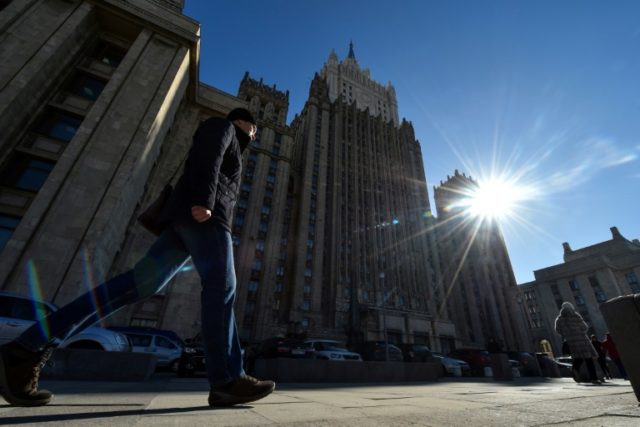London (AFP) – The daughter of an ex-Russian spy hit in a nerve agent attack that has chilled Russia’s relations with the West is no longer critical, a hospital said Thursday, as Moscow expelled 60 US diplomats in the latest tit-for-tat move.
Yulia Skripal, 33, was “improving rapidly and is no longer in a critical condition”, said the hospital where she and her father have been treated since the March 4 attack blamed on Moscow by Britain.
She was now “stable” with the BBC reporting that she was conscious and talking.
Her father Sergei Skripal, 66, a former Russian double agent, remains in a critical but stable condition, said the hospital in the southwestern English city of Salisbury.
The announcement came as Russia hit back at the US’s earlier expulsion of 60 diplomats and shut down the Russian consulate general in Seattle.
Russian Foreign Minister Sergei Lavrov said the US ambassador had been informed of “retaliatory measures”, saying that “they include the expulsion of the equivalent number of diplomats and our decision to withdraw permission for the functioning of the US consulate general in Saint Petersburg”.
Lavrov added that Russia would also issue tit-for-tat responses to the other countries that have expelled diplomats in a mass show of support for Britain.
Russia was reacting to “absolutely unacceptable actions that are taken against us under very harsh pressure from the United States and Britain under the pretext of the so-called Skripal case”, he said.
Washington earlier ordered the expulsion of 60 diplomats and shut down the Russian consulate general in Seattle.
The attack on the Skripals has been met with a major response that has seen more than 150 Russian diplomats expelled from countries around the world.
Britain’s earlier expulsion of Russian diplomats has been backed by the NATO defence alliance, the United States, 18 European Union nations and other countries.
British authorities have accused Russia of being behind the attack, which Moscow denies, and said a Soviet-designed nerve agent dubbed Novichok was used in the poisoning — the first use of chemical weapons in Europe since World War II.
A court last week heard that Yulia Skripal could not communicate in any meaningful way, while her father could not communicate at all.
British counter-terror police on Wednesday said the Skripals first came into contact with a nerve agent at his Salisbury home — with the highest concentration on the front door.
British police said around 250 counter-terrorism detectives are working on the case, which could continue for months.
Around 500 witnesses have been identified and police are looking through more than 5,000 hours of security camera footage.
– Novichok on front door –
“We believe the Skripals first came into contact with the nerve agent from their front door,” Dean Haydon, Britain’s counter-terror police chief, said on Wednesday.
“Traces of the nerve agent have been found at some of the other scenes detectives have been working at over the past few weeks, but at lower concentrations to that found at the home address.”
Investigators had sealed off the bench where the Skripals were found, a pub and restaurant the pair visited, the grave of the former spy’s wife and a children’s play area near Skripal’s home.
The BBC’s security correspondent Gordon Corera said the highest concentration was found on Skripal’s door handle and could have been administered through a “gloopy substance which could have been smeared on”.
It would explain why the nerve agent may have been found on Skripal’s car or the restaurant in which they had eaten, he added.
Alastair Hay, professor emeritus of environmental toxicology at Leeds University, said little was known about the Novichok family of nerve agents.
However, in persistent agents like the better-known VX, contamination is generally through the skin and the full effects are not immediate.
“In situations like the one involving the Skripals, it is likely there would have been delayed onset of symptoms like headaches, feeling nauseous, feeling very weak and possibly vomiting, after the typical exposure occurs through skin contact,” he said.
Skripal sold secrets to Britain and moved there in a 2010 spy swap. His daughter was visiting from Russia.
– Breaking point –
Moscow is facing a “global wave of revulsion” in response to the nerve agent attack on a former Russian spy, Britain’s Foreign Secretary Boris Johnson said.
“The Kremlin underestimated the strength of global feeling,” Johnson said at a speech late Wednesday in London.
While the Skripals remain in hospital, a police officer who responded to the attack was discharged last week.
International experts from the Organisation for the Prohibition of Chemical Weapons arrived in Salisbury on March 20 to verify Britain’s findings.
Meanwhile more than £880 million ($1.25 billion, one billion euros) of British property claimed to have been bought by Russians with suspect money is to be investigated by a parliamentary inquiry.
The Treasury Select Committee said it will probe the scale of economic crime in Britain following claims the country — in particular the London property market — has become the “destination of choice” to launder money.

COMMENTS
Please let us know if you're having issues with commenting.